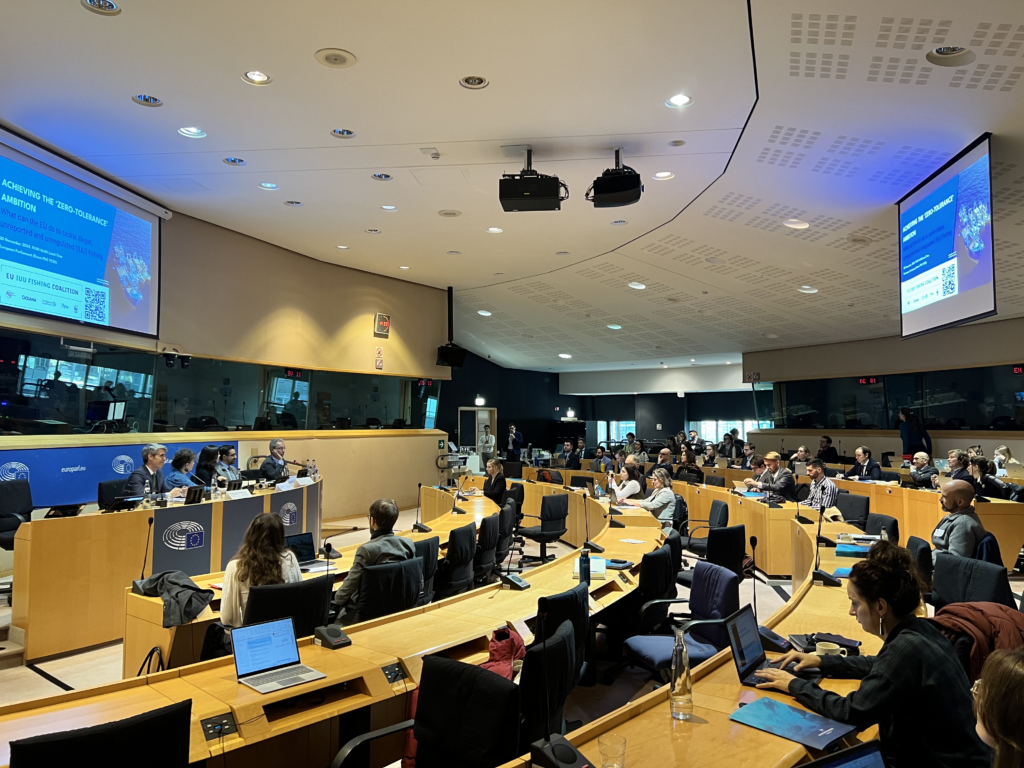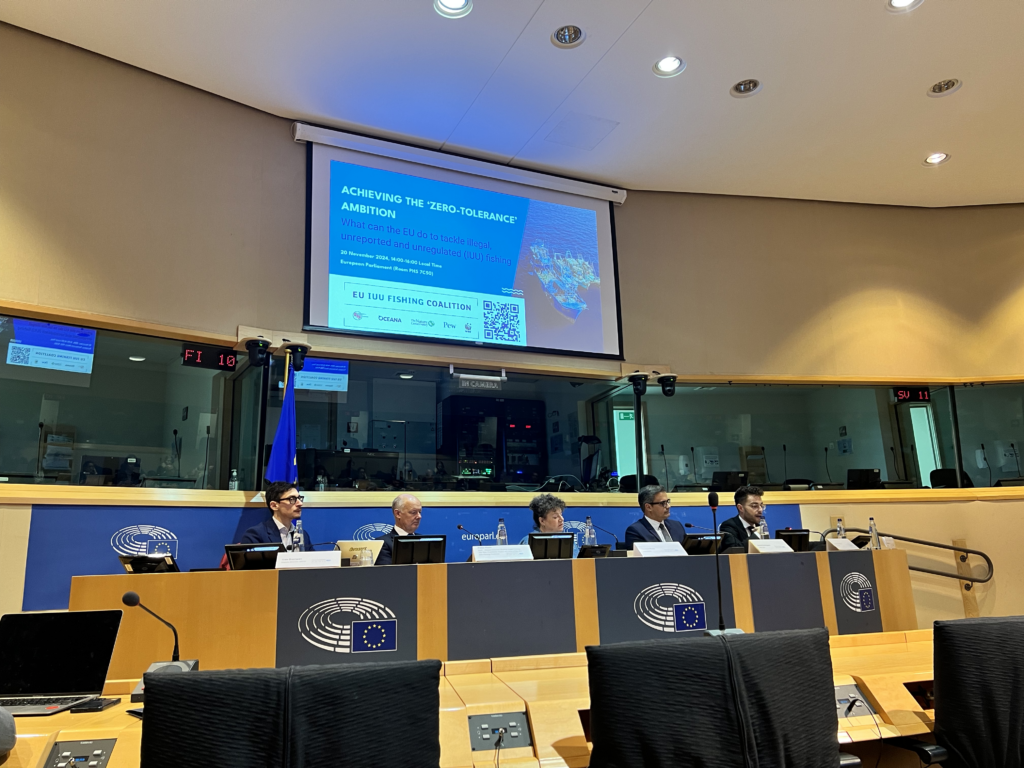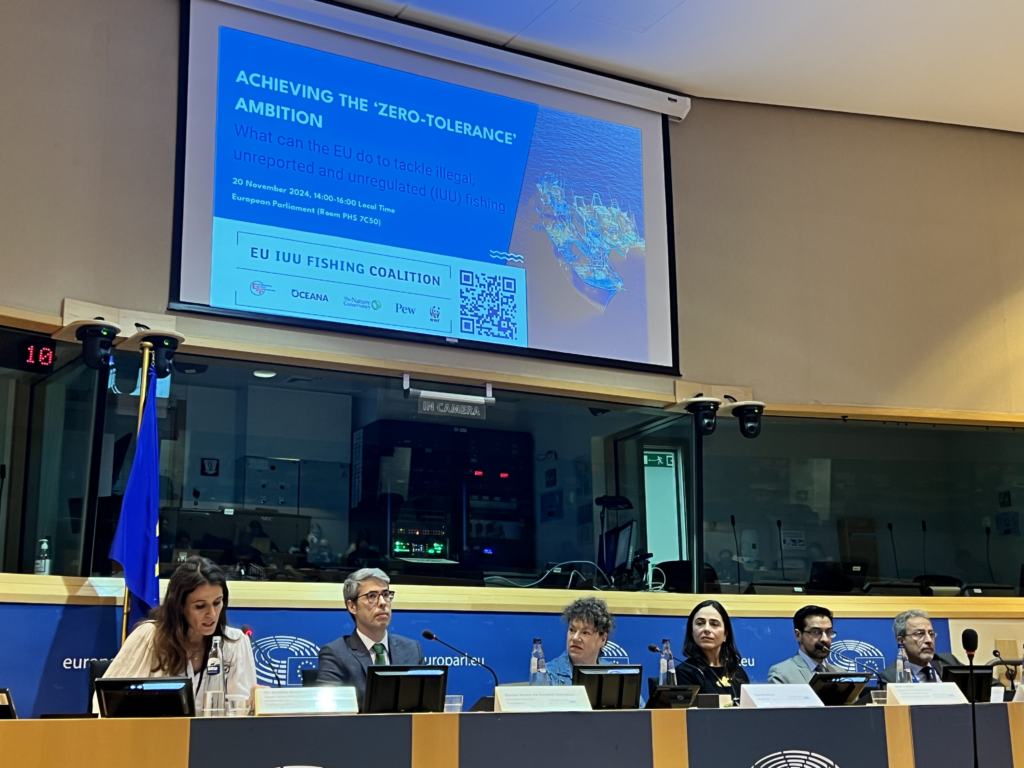
Various political parties and stakeholder groups jointly emphasised the importance for the new EU institutions to lead the way in ramping-up the global fight against IUU fishing. Better implementation of the existing EU legal framework will be key to achieving the Commission’s zero-tolerance ambition towards IUU, levelling the playing field for EU fishers, and to securing the future of our oceans and of the people who depend on its resources.
Introduction
On 20th November 2024, the EU IUU Fishing Coalition, alongside Members of the European Parliament (MEPs) André Rodrigues (S&D), Thomas Bajada (S&D) and Fredis Beleris (EPP) co-hosted a high-impact event titled “Achieving the zero-tolerance ambition against IUU Fishing” at the European Parliament to spotlight the urgent need to address the issue of illegal, unreported and unregulated (IUU) fishing – including through the upcoming Ocean Pact. It convened the European Parliament, European Commission, the United Nations Office on Drugs and Crime (UNODC), the fishing industry (Europêche) and civil society to explore the far-reaching impacts of IUU fishing on marine ecosystems, the global economy, and fisheries. Special attention was also given to the disproportionate impacts on small-scale fishing communities.
Over two hours, participants discussed how the EU could bolster its efforts to combat these challenges and examined the European Parliament’s role in addressing IUU fishing.
The urgent need for immediate action against IUU fishing
IUU fishing poses a significant threat to our ocean. It destroys marine ecosystems, undermines sustainable fisheries management, jeopardises efforts to ensure global food security and endangers the livelihoods of coastal communities and responsible fishers. Over 20% of the world’s seafood catch is linked to IUU fishing, generating up to a shocking €30 billion per year in illegal profits globally.
- Peter Horn MBE (Project Director, Ending Illegal Fishing, The Pew Charitable Trusts) emphasised: “The regulations are as strong as the Member States implementation. This is the perfect time to have this meeting; as the new Commission starts its work, we need the EU and its Member States to stay strong and continue their leadership in the fight against IUU fishing.”
- John Kerry (Former United States Secretary of State and Presidential Envoy for Climate), in his video message, remarked: “Tackling IUU fishing is not only about conserving marine life; it is a matter of justice and stability for millions of people” and urged members of the European Parliament to “reinforce EU’s leadership, not only by supporting best practices and policies but by ensuring the EU allocates the resources needed to make a genuine impact.”
- MEP André Franqueira Rodrigues (S&D) underscored the EU’s global leadership: “The EU already has a landmark piece of legislation worldwide, the IUU Regulation. The EU and Member States zero-tolerance policy needs to continue to involve all countries, regardless of size. We must protect marine ecosystems and ensure fair competition.”
- MEP Thomas Bajada (S&D) highlighted the social dimensions: “1 in every 5 fish consumed could originate from illegal practices. It is clearly an environmental crisis. It is an impending threat to the health of our Ocean, marine biodiversity and our fish stocks, on which, the livelihood of millions of people depend on, for food and income. (…) the fight against IUU fishing is a fight for environmental sustainability, social justice, and human dignity.”
- In his intervention MEP Fredis Beleris (EPP) emphasised: “IUU fishing is a global crisis, not only a threat to marine biodiversity but also to coastal communities worldwide. The EU has the capacity and responsibility to lead by example and create a system that holds everyone accountable from the boat to the plate.”

Civil Society and Industry Back the Carding System
The EU carding scheme is a key regulatory measure to combat IUU fishing by non-EU countries and is essential to the EU’s overall IUU fishing regulations. The scheme’s main focus is to promote bilateral dialogues and reforms to promote compliance and tackle IUU fishing. Countries that fail to comply with international fishing standards may receive a “yellow card” (warning) and, if non-compliance and/or non-collaboration continues, a “red card,” which results in a seafood exports ban to the EU, among other sanctions. This system aims to promote stronger fisheries governance and deter illegal practices globally by making compliance with sustainable fishing standards a prerequisite for trade with the EU.
The EU IUU Fishing Coalition supports the carding scheme and highlights its effectiveness in encouraging countries to strengthen their fisheries oversight, as seen in case studies from Belize, Guinea, the Solomon Islands and Thailand.
- Daniel Voces (Managing Director, Europêche) voiced support for the EU’s carding system, noting that “on behalf of the whole industry, we support this IUU tool to improve not only the situation in Europe but also in the world. I think that compliance costs are outweighed by the advantages resulting from the implementation of the IUU Regulation. We are alleviating pressure on fishing resources and eliminating unfair competition.”
- Roberto Cesari (Head of Unit, European Commission DG MARE B4 (Illegal, Unreported and Unregulated Fisheries Policy)) noted that DG MARE’s IUU unit in specific cases and circumstances, and with solid evidences at its disposal, could also consider the possibility to expedite carding decisions: “ If we have critical cases supported by the necessary level of hard evidences and if we see that there’s no cooperation from third countries, we could consider to speed up the process between a yellow and a red card. The main objective, though, remains to enhance the cooperation with third countries and support them in raising the standards and that’s what we are working on.”
- In her closing statement, Dr. Amélie Giardini (Ocean Policy Officer, EJF) highlighted that, “The carding system has proven its great worth, driving improvements in non-EU countries and helping create a level playing field. NGOs and Europêche agree – its scope must be expanded.”
Click here to view the EU IUU Fishing Coalition’s map of EU carding decisions.
European Commission’s priorities on IUU Fishing
Roberto Cesari emphasised the Commission’s commitment to fighting IUU fishing, outlining how important a tool the EU’s market power can be, stating “we have to have a zero tolerance approach towards trade in illegally caught fish. If the products that are exported to our market stem from illegal activities, we should not allow them to reach our consumers.” He also noted that securing a level playing field between the EU and third country stakeholders is a priority.
The issue of Flags of Convenience and the importance of beneficial ownership transparency
Flags of Convenience pose a major threat, as they allow vessel operators to register under countries with minimal regulations and weak enforcement capabilities. This lack of oversight makes it easy for vessels to operate without adhering to sustainable practices, undermining global fisheries management efforts. By using Flags of Convenience, operators can “flag hop” to avoid penalties, creating a regulatory gap that encourages illegal activities. This has sparked calls for stricter global standards on vessel registration, ensuring that flag states meet their obligations to monitor and control vessels they register.
Beneficial ownership transparency is key to overcoming these challenges. When vessel ownership is obscured, it is difficult to identify those responsible, enabling illegal operators to evade detection. Enhanced beneficial ownership transparency would allow for better tracking of illegal activities and prevent IUU operators from exploiting weak regulatory frameworks, ultimately supporting more sustainable fisheries management.
- Julien Garsany (Representative to the EU, NATO and Belgium, (UNODC) highlighted the connection between IUU fishing and other illicit activities, stating “when we look at crime in the fisheries sector, we follow the supply chain not only in the boats but on land there’s many illegalities that can happen including money laundering, corruption and tax evasion.” Mr. Garsany went on to emphasise the importance of beneficial ownership transparency, sharing that “without knowing who owns the fleet, it creates issues in terms of conflicts of interests, who makes the rules and who are they for… if you can’t trace the effective owners it’s difficult to fight against them.” He also urged countries to have registries “as clean as possible” and to “connect, collect and cooperate with law enforcement.”
- Vera Coelho (Deputy Vice-President Europe, Oceana) further addressed the role of flags of convenience in undermining transparency, calling on the EU to establish a publicly accessible register of companies that have interests in non-EU countries. “Seafood is the most traded commodity in the world, when illegalities take place are detected and sanctioned, at the end of the day the ones sanctioned are the crew and captain but not the owner. The money is collected by the owner, the environmental crime is associated with the crew, which is not fair.”
Harmonised import controls needed to prevent entry of IUU products into the EU
The EU IUU Fishing Coalition advocates for harmonised and robust import controls across EU member states to prevent IUU-caught seafood from entering the European market. This need stems from inconsistencies in how different member states enforce the EU’s IUU fishing Regulation. This variation in control creates vulnerabilities, allowing illegally-sourced seafood to enter markets via states with less rigorous checks—an issue known as “control shopping.”
After years of the Coalition advocating for a digital system to control catch certificates accompanying seafood imports into the EU, the European Commission has developed CATCH, an IT tool to streamline checks and verifications of fishery product imports. As of 10 January 2026, use of CATCH will be mandatory for EU operators and authorities through the most recent revision of the IUU Regulation. Whilst the CATCH system will strengthen controls and improve transparency, it will not resolve all implementation challenges, such as the quality or frequency of verifications and inspections of risky seafood imports.
- Daniel Voces stressed that “70% of the seafood consumed in Europe is imported from third countries. It doesn’t make sense to impose stringer controls on EU seafood production while overlooking imports. Existing gaps and shortcomings in import controls must be urgently addressed to ensure equal treatment of both EU and non-EU products. It’s fundamental we have a strong policy [the IUU Regulation] and new policies that complement these actions, like the novel EU regulation against Forced Labour together with the Due Diligence regulation to fight against this from all possible angles.”
- Importantly, Roberto Cesari noted that in relation to legal obligations binding on Member States, the European Commission will be monitoring their level of compliance, and, if need be, act accordingly to the EU law.

Conclusion
The event concluded with a recorded video message from MEP Stéphanie Yon-Courtin (Renew). On the threat of IUU fishing, MEP Yon-Courtin stressed that “the start of this new mandate provides the opportunity to put this fight on the EU agenda and on top of our priorities for EU fisheries policies.”
The event highlighted a unified message from policymakers, industry and environmental advocates alike: the EU must continue to lead the global effort against IUU fishing through enhanced transparency, accountability and collaborative action. The European Parliament plays a crucial role in pushing for stronger enforcement of EU regulations and championing calls for an ambitious Oceans Pact. By prioritising these initiatives, the EU and European Parliament can ensure a sustainable and resilient future for oceans worldwide.
